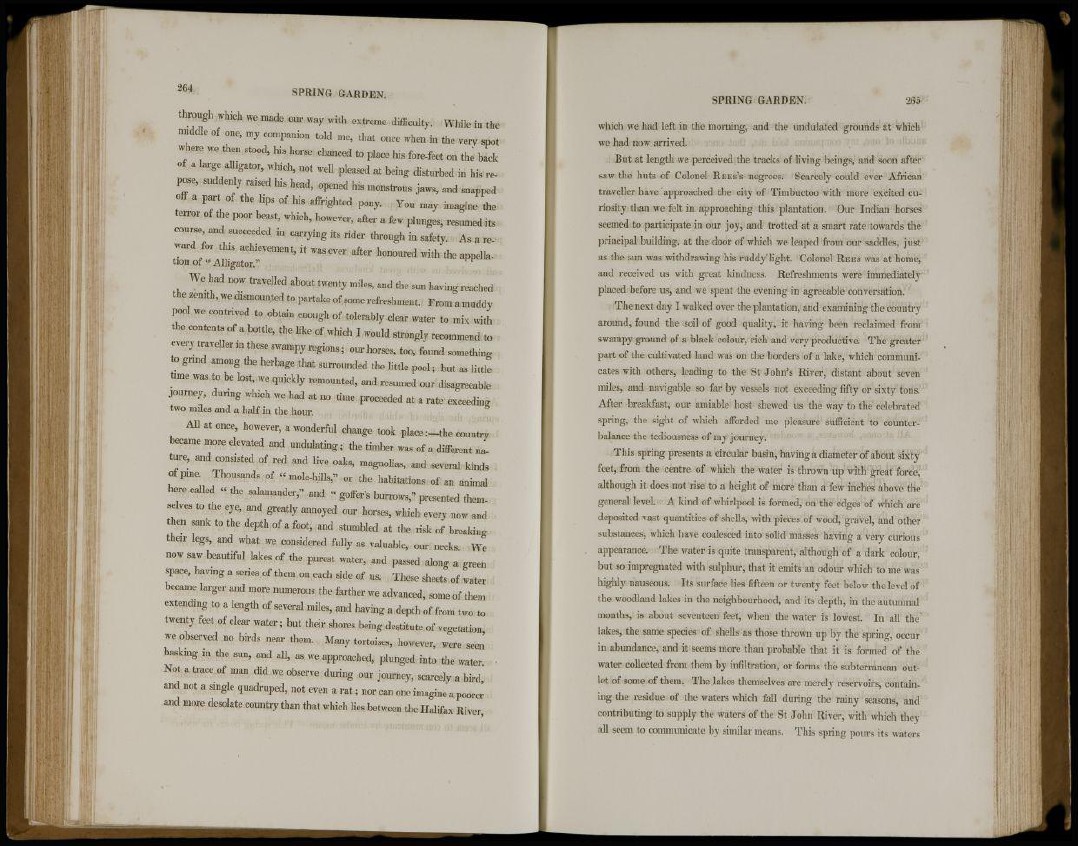
264
SPRING GARDEN.
through which we made our way with extreme difficulty. While in the
middle of one, my companion told me, that once when in the very spot
where we then stood, his horse chanced to place his fore-feet on the back
of a large alligator, which, not well pleased at being disturbed in his repose,
suddenly raised his head, opened his monstrous jaws, and snapped
off a part of the lips of his affrighted pony. You may imagine the
terror of the poor beast, which, however, after a few plunges, resumed its
course, and succeeded in carrying its rider through in safety. As a reward
for tins achievement, it was ever after honoured with the appellation
of t f Alligator
We had now travelled about twenty miles, and the sun having reached
the zenith, we dismounted to partake of some refreshment. From a muddy
pool we contrived to obtain enough of tolerably clear water to mix with
the contents of a bottle, the like of which I would strongly recommend to
every traveller in these swampy regions; our horses, too, found something
to grind among the herbage that surrounded the little pool; but as little
time was to be lost, we quickly remounted, and resumed our disagreeable
journey, during which we had at no time proceeded at a rate exceeding
two miles and a half in the hour.
All at once, however, a wonderful change took place:—the country
became more elevated and undulating ; the timber was of a different nature,
and consisted of red and live oaks, magnolias, and several kinds
of pine. Thousands of " mole-hills,'" or the habitations of an animal
here called " the salamander," and " goffer's burrows,11 presented themselves
to the eye, and greatly annoyed our horses, which every now and
then sank to the depth of a foot, and stumbled at the risk of breaking
their legs, and what we considered fully as valuable, our necks. We
now saw beautiful lakes of the purest water, and passed along a green
space, having a series of them on each side of us. These sheets of water
became larger and more numerous the farther we advanced, some of them
extending to a length of several miles, and having a depth of from two to
twenty feet of clear water; but their shores being destitute of vegetation,
we observed no birds near them. Many tortoises, however, were seen
basking in the sun, and all, as we approached, plunged into the water.
Not a trace of man did we observe during our journey, scarcely a bird,
and not a single quadruped, not even a rat; nor can one imagine a poorer
and more desolate country than that which lies between the Halifax River,
SPRING GARDEN. 2 6 5
which we had left in the morning, and the undulated grounds at which
we had now arrived.
But at length we perceived the tracks of living beings, and soon after
saw the huts of Colonel REES'S negroes. Scarcely could ever African
traveller have approached the city of Timbuctoo with more excited curiosity
than we felt in approaching this plantation. Our Indian horses
seemed to participate in our joy, and trotted at a smart rate towards the
principal building, at the door of which we leaped from our saddles, just
as the sun was withdrawing his ruddy'light. Colonel REES was at home,
and received us with great kindness. Refreshments were immediately
placed before us, and we spent the evening in agreeable conversation.
The next day I walked over the plantation, and examining the country
around, found the soil of good quality, it having been reclaimed from
swampy ground of a black colour, rich and very productive. The greater
part of the cultivated land was on the borders of a lake, which communicates
with others, leading to the St John's River, distant about seven
miles, and navigable so far by vessels not exceeding fifty or sixty tons.
After breakfast, our amiable host shewed us the way to the celebrated
spring, the sight of which afforded me pleasure sufficient to counterbalance
the tediousness of my journey.
This spring presents a circular basin, having a diameter of about sixty
feet, from the centre of which the water is thrown up with great force,
although it does not rise to a height of more than a few inches above the
general level. A kind of whirlpool is formed, on the edges of which are
deposited vast quantities of shells, with pieces of wood, gravel, and other
substances, which have coalesced into solid masses having a very curious
appearance. The water is quite transparent, although of a dark colour,
but so impregnated with sulphur, that it emits an odour which to me was
highly nauseous. Its surface lies fifteen or twenty feet below the level of
the woodland lakes in the neighbourhood, and its depth, in the autumnal
months, is about seventeen feet, when the water is lowest. In all the
lakes, the same species of shells as those thrown up by the spring, occur
in abundance, and it seems more than probable that it is formed of the
water collected from them by infiltration, or forms the subterranean outlet
of some of them. The lakes themselves are merely reservoirs, containing
the residue of the waters which fall during the rainy seasons, and
contributing to supply the waters of the St John River, with which they
all seem to communicate by similar means. This spring pours its waters